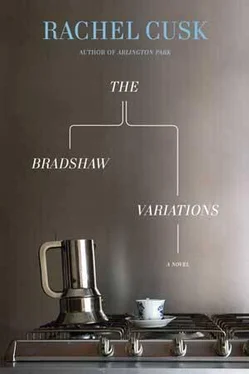‘God, I feel like shit,’ she says, half-closing her eyes. The lids are bruised with make-up. She opens them again. ‘Greg and I had a fight last night.’
‘What about?’
She swats the air, shakes her head.
‘I don’t know what exactly. We were just — fighting.’
Tonie wonders how this occurs: Janine’s small flat, her daughter there, two adults trying to kindle something in the ashes of everything that has been, and either failing or succeeding in full view of it all. In certain lights she has considered Janine’s life and envied it, envied its open-endedness, its lack of structure. She imagines possibilities for Janine that she cannot imagine for herself: the possibility of changing, moving, experiencing the unknown.
‘Francesca was at the Bastard’s,’ Janine says, reading her thoughts. ‘Greg came over to spend the night.’
‘Is that how it works? She goes and he comes.’
Janine nods. ‘Right,’ she says. ‘Like a French farce.’
‘I imagine it less — scheduled.’
‘Darling,’ Janine says jadedly, ‘it’s a bloody rota. There’s Greg’s three from marriage one at the weekends, one from marriage two twice a month, a stepchild who has to fit in somewhere, a dog that needs walking, a cat that has to go to the vet. I’m off-peak nights only.’
‘And you spent it fighting. Your night.’
Janine yawns, stretches her mottled arms, shows a crumpled glimpse of speckled armpit. Tonie feels it again, the mother, the taxed body, lapsing into imperfection.
‘Well, you’re sort of asking for it, aren’t you?’ Janine says. ‘You get home, stash the child, clean up, light the candles, shave your legs, open the wine — you’re really asking for your poor plans to be undone. Though in fact, that part was fine. It was later.’ She yawns again. ‘Three o’clock in the morning, I wake up and he’s standing there by the bed.’
‘Getting in?’
‘Getting out. Apparently I said something in my sleep.’
‘What sort of thing?’
‘Apparently I said —’ Janine laughs ‘— Roger .’
Tonie snorts, slaps the table top.
‘So he puts all his clothes back on and he storms out of the room. I thought he’d gone home, and I was so sleepy I thought, you know, fine. I didn’t care. I just wanted to go back to sleep. Has that ever happened to you?’
Tonie half-assents, silently.
‘I think this is the real disenchantment of later life,’ Janine says, pushing away her coffee cup. ‘The inability to care. Having cared so much.’
Tonie shudders. ‘Stop it.’
‘Anyway, after a while I hear noises and I realise he’s still here. So I drag myself out of bed and I go into the kitchen and there he is, sitting at the table with all the lights on and his laptop out. Working.’
They laugh: the apparent ridiculousness of male behaviour.
‘How are you, anyway?’ Janine says. She puts her spoon in the sugar bowl, takes it out and carefully licks it.
‘All right.’
Tonie doesn’t want to explain: language takes her further away from it, the mystery of her expectation. She remembers travelling somewhere with Thomas once, driving through miles and miles of empty wilderness, the map open on her knees; she remembers the way it looked on the page, the road threading through the emptiness, specifying itself while everything else remained unknown and untouched. They would have to stop, get out, walk. To know what was there they would have to enter it physically.
‘I’m just — here,’ she says, meaning this place, this concrete building on the roadside.
‘Is it what you wanted?’ Janine says, bright, matter-of-fact, as though they were discussing a present Tonie had received, both knowing that at their age there was no point masking your disappointment.
‘I don’t not want it. It depends. It depends how it works out.’
She can tell Janine doesn’t understand: in Janine’s eyes Tonie has done something irrational, has strayed from their particular female church with its ceaseless interpolations of the personal and the practical, its reverence for emotion, its believers-only humour where the punchline is always that you get away with whatever you can. Janine would not understand Tonie’s desire for the harsh, the literal, the coldly imposing. She would not understand her decision to set down the sack of emotion.
‘I’d miss the teaching,’ is all she says, looking over Tonie’s shoulder.
She is not the first person to say this to Tonie: here, teaching is equivalent to emotion. The women Tonie knows at home say they would miss the children, in exactly the same way.
‘You can’t teach if you’re sick of books,’ Tonie says softly.
She sees it in Janine’s eyes, a flash of fear, a spark of genuine teacher’s disapproval. There’s a second of hesitation, then Janine laughs. She has decided that Tonie is being iconoclastic.
‘Books make you sick,’ she agrees. ‘Literature. A virus.’ She screws up her eyes, looks at Tonie through the lashes. ‘Though spreadsheets can’t be all that interesting.’
Tonie shrugs. She isn’t going to defend herself.
‘I hope it works out,’ Janine says, all at once slightly formal, as though Tonie is going away somewhere and never coming back. Tonie looks up. Martin Carson is standing by their table.
‘Oops —’ Janine looks at her watch ‘— I’ve got to go and teach Hart Crane.’
‘Really?’ he says, significantly, as though Hart Crane were an opinion, not a poet. He turns to Tonie, bores into her through his thick pebbly lenses. ‘How are you? ’ he says.
‘Okay,’ she says. She looks at her watch too. ‘Late.’
‘I like what you’ve done with your hair,’ Martin says. He has a transatlantic accent, difficult to place. It makes everything he says sound ironic. Tonie has seen him lash out at his students, has seen him mortify big ropey-limbed boys in baseball caps, silent overweight girls with round cheeks encrusted with make-up and acne. He strikes at them with this ironic-sounding drawl: he makes them seem unfortunate and stupid.
‘Thanks.’
‘I’ll walk with you,’ he says.
Janine rolls her eyes, waves her hand, makes a run for it in her silver shoes.
‘I have the feeling I interrupted something important there,’ Martin says, with professorial satisfaction. ‘I was watching your face. You looked — wistful. Sort of sad, but thoughtful.’
He does an imitation of it, there in the crowded corridor. He rests his fingers under his chin and gazes into the middle distance.
‘Thanks,’ she says again.
They go left and right and left along the grey-walled passages with their littered noticeboards and chipped paint, and Martin sticks to her as they push through the field of bodies, saying, ‘Hello,’ and, ‘How are you? ’ to those students who raise their eyes to him. Instantly they look troubled, slightly guilty, as though their individuality was something they were meant to be concealing. She sees no blaze of youth in these faces, these bodies: they have bad skin, piercings, stiff, artificial-looking hair. They look pensive, irresolute, like people who have got off a train in the wrong town. They look like people to whom nothing has ever been explained.
‘Hello, Jamie ,’ Martin says in the lift, to a chalk-white boy with a petrified fan of hair like a cockatoo’s. ‘I’m glad that you found the time to come in today. Really, I’m glad.’
They get out, leave Jamie gaping and solitary in the steel cubicle, pass through the double doors to their offices.
‘We should have coffee some time,’ Martin says, leaning against the door frame where Tonie turns off.
Tonie wants to be in her office, tucked up alone in the grey rectangle with its view of the car park, but instead she says: ‘Do you think they’re enjoying themselves?’
Читать дальше












